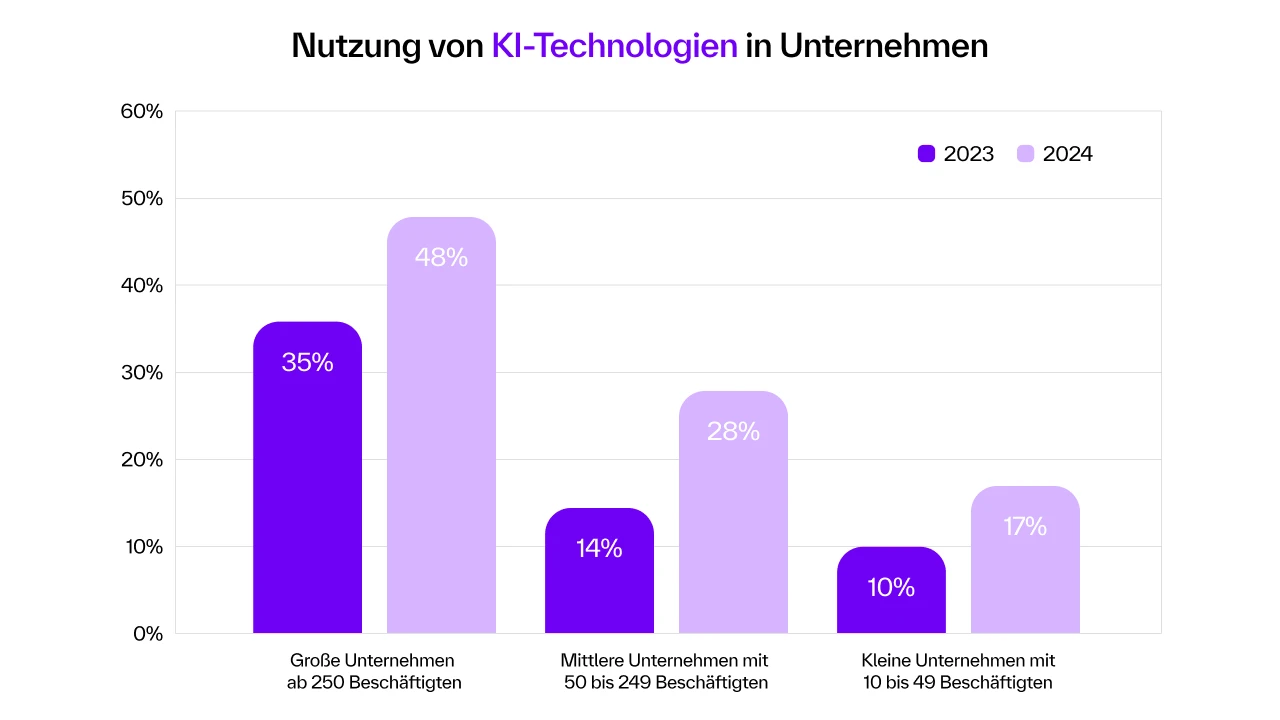Künstliche Intelligenz (KI) revolutioniert die Arbeitswelt – und der neue EU AI Act gibt klare Vorgaben für den KI-Einsatz. Für Unternehmen heißt das: jetzt die Weichen stellen und KI-Kompetenzen aufbauen. Doch wie gelingt der Start in die KI-gestützte Zukunft, welche Technologien eignen sich wofür und welche Herausforderungen gibt es?
Dieser Leitfaden zeigt Ihnen, wie Sie KI im Unternehmen erfolgreich einführen. Sie erfahren, in welchen Bereichen KI schon heute einen klaren Mehrwert schafft, wie Sie Hindernisse überwinden und Ihre Mitarbeitenden fit für die digitale Transformation machen.
Aktuelle Trends: Nutzung von KI in Zahlen
Die Zahlen sprechen eine klare Sprache: Künstliche Intelligenz prägt immer stärker den Unternehmensalltag in Deutschland. Laut aktuellem Bericht des Statistischen Bundesamts nutzte im Jahr 2024 jedes fünfte Unternehmen KI-Technologien – ein Anstieg um 8 % innerhalb eines Jahres. Dabei setzen Unternehmen vor allem auf:
- Textanalyse und Text Mining (48 %)
- Spracherkennung (47 %)
- Erzeugung natürlicher Sprache (34 %)
Die Bereitschaft, Künstliche Intelligenz im Unternehmen einzuführen, unterscheidet sich stark nach Unternehmensgröße. Während knapp die Hälfte der Großunternehmen (48 %) bereits auf KI-Systeme setzt, sind es bei mittleren Unternehmen 28 % und bei kleinen Unternehmen 17 %.

Auch zwischen den Branchen gibt es bei der KI-Nutzung deutliche Unterschiede: Der Digitalisierungsindex 2024 des Bundesministeriums für Wirtschaft und Klimaschutz zeigt die IT- und Kommunikationsbranche als klaren Spitzenreiter, gefolgt von der Elektrotechnik-, Maschinen- und Fahrzeugbaubranche. Das Schlusslicht bilden das Baugewerbe sowie die Ver- und Entsorgung.
Hürden bei der KI-Einführung
Trotz der positiven Entwicklung scheuen laut Statistischem Bundesamt noch viele Unternehmen, KI für ihre Anwendungen und Prozesse einzusetzen. Das sind die wichtigsten Gründe:
- mangelndes Wissen (71 %)
- Unsicherheit zu den rechtlichen Folgen (58 %)
- Bedenken beim Datenschutz und bei der Privatsphäre (53 %)
Welche konkreten Herausforderungen es beim Einsatz von KI gibt und wie Sie diese meistern, erfahren Sie später in diesem Artikel.

KI Lernreise
Zwischen dem Wunsch, mit KI die Zukunft zu gestalten, und den dafür notwendigen Fähigkeiten klafft derzeit noch eine große Lücke. Wie Sie die Lücke vermessen und anschließend nachhaltig schließen, zeigen wir Ihnen in diesem Whitepaper zu KI Lernreise.
Zum Whitepaper Download
So setzen Unternehmen KI in der Praxis ein
Die Einsatzmöglichkeiten für KI im Unternehmen sind vielfältig. Das zeigt auch die aktuelle Studie des Statistischen Bundesamtes: Besonders häufig nutzen Unternehmen KI im Vertrieb oder Marketing (33 %). Weitere wichtige Einsatzgebiete sind Produktions- oder Dienstleistungsprozesse (25 %) sowie die Organisation von Verwaltungsprozessen oder das Management (24 %). Von der Produktion bis zum Kundenservice – überall können intelligente Systeme Ihre Mitarbeitenden unterstützen.
Ein Überblick über verschiedene Einsatzgebiete von KI im Unternehmen:
Maschinelles Lernen optimiert Ihre Prozesse
Mit Machine Learning (maschinelles Lernen, ML) analysieren Unternehmen große Datenmengen und treffen daraus fundierte Entscheidungen:
- Optimierung des Energieverbrauchs in der Produktion durch intelligente Steuerungssysteme
- automatische Erkennung auffälliger Muster in Finanztransaktionen
- präzise Nachfrageprognosen für die Lagerhaltung
Generative KI revolutioniert Marketing und Personal
Generative KI erstellt automatisch Texte, Bilder oder Programmcode. Typische Einsatzgebiete sind:
- Erstellung von Produktbeschreibungen und Marketingtexten in verschiedenen Varianten
- Entwicklung neuer Designideen und Konzepte
- automatisierte Erstellung von Schulungsmaterialien für Weiterbildungen
- adaptives Lernen zur individuellen Anpassung von Trainingsinhalten an den Wissensstand der Mitarbeitenden
Automatisierung schafft Freiraum für wichtige Aufgaben
Robotic Process Automation (RPA) kombiniert mit KI übernimmt zeitraubende Routinearbeiten:
- automatische Verarbeitung und Prüfung von Dokumenten
- digitale Erfassung und Buchung von Rechnungen
- KI-gestützte Optimierung von Logistikprozessen
Computergestützte Bildverarbeitung steigert die Qualität
Computer Vision erkennt Muster in Bildern und Videos. Das sind typische Anwendungen:
- automatische Qualitätskontrolle in der Produktion
- Überwachung von Sicherheitsstandards
- Erkennung von Oberflächenfehlern in der Fertigung
Sprachverarbeitung verbessert den Service
Natural Language Processing (NLP) versteht und verarbeitet menschliche Sprache:
- automatische Beantwortung häufiger Kundenanfragen durch KI-Chatbots
- intelligente Analyse von Vertragsdokumenten
- automatisierte Auswertung von Fachliteratur
Diese Übersicht zeigt: Künstliche Intelligenz lässt sich in nahezu allen Unternehmensbereichen sinnvoll einsetzen. Entscheidend ist, die richtige Technologie für Ihre spezifischen Anforderungen zu wählen.
Herausforderungen beim KI-Einsatz meistern
Fehlendes Know-how, rechtliche Unsicherheiten und Bedenken beim Datenschutz bremsen viele Unternehmen bei der KI-Einführung. Doch mit der richtigen Strategie können Sie diese Hürden überwinden und die Chancen von KI für nachhaltiges Wachstum ergreifen.
Technische Infrastruktur als Basis
Vor allem, wenn Unternehmen KI zur massenhaften Datenverarbeitung nutzen möchten, müssen die technischen Voraussetzungen stimmen. Häufige Herausforderungen:
- Viele Unternehmen kämpfen mit veralteten IT-Systemen.
- Daten liegen häufig in verschiedenen Formaten und Systemen vor.
- Die vorhandene Rechenleistung reicht oft nicht aus.
Moderne Cloudlösungen und ein durchdachtes Datenmanagement schaffen heute die Basis für erfolgreiche KI-Projekte.
Datenschutz und Rechtssicherheit gewährleisten
Für eine vollständige Rechtssicherheit fehlen vielen Verantwortlichen noch die Beispiele zum Einsatz von KI im Unternehmen. Das wirft viele Fragen auf:
- Wie lässt sich die Verarbeitung personenbezogener Daten rechtskonform gestalten?
- Welche Dokumentationspflichten müssen Sie erfüllen?
- Wer haftet bei KI-gestützten Entscheidungen?
Der EU AI Act definiert klare Regeln für den KI-Einsatz. Der Rechtsrahmen bietet die Chance, KI im Unternehmen von Anfang an vertrauenswürdig und rechtskonform zu integrieren.
Menschen im Wandel begleiten
Die Einführung von KI verändert die Arbeitsprozesse und Unternehmenskultur grundlegend:
- Die Mitarbeitenden müssen im Umgang mit den neuen KI-Systemen Sicherheit gewinnen.
- Viele Beschäftigte sorgen sich, dass automatisierte Anwendungen ihre Arbeitsplätze gefährden könnten.
- Im Unternehmen entstehen völlig neue Rollen und Verantwortlichkeiten.
- Die bestehenden Team- und Organisationsstrukturen verändern sich durch KI-gestützte Prozesse.
Ein durchdachtes Change Management (Veränderungsmanagement) macht diesen Wandel für alle Beteiligten zum positiven Erlebnis. Ziel hierbei ist es, die Veränderungen in der Organisation zu begleiten und neue Arbeitsweisen in der Unternehmenskultur zu verankern. KI-Expert:innen aus den Fachabteilungen können dabei wichtige Impulsgeber:innen sein.
Kosten und Nutzen richtig einschätzen
Für eine erfolgreiche KI-Transformation müssen Unternehmen verschiedene Kostenfaktoren berücksichtigen:
- Sie müssen in die technische Infrastruktur und passende Software investieren.
- Es entstehen Kosten für die Qualifizierung der Mitarbeitenden und externe Beratung.
- Der laufende Betrieb und die Wartung der Systeme erfordern kontinuierliche Investitionen.
Die Praxis zeigt jedoch: Gut geplante KI-Projekte zahlen sich durch Effizienzgewinne und neue Geschäftsmöglichkeiten aus. Für Deutschland prognostizieren Expert:innen sogar einen Produktivitätsschub durch Künstliche Intelligenz von 29 % bis zum Jahr 2035.
 Mehr Infografiken finden Sie bei Statista
Mehr Infografiken finden Sie bei Statista
Die genannten Herausforderungen sind keine unüberwindbaren Hürden – sie sind vielmehr Meilensteine auf dem Weg zur erfolgreichen KI-Nutzung. Im nächsten Kapitel zeigen wir Ihnen, wie Sie diese Transformation systematisch und erfolgreich gestalten.
Erfolgreicher Einsatz von KI in Unternehmen
Erfolgreiche KI-Projekte brauchen einen klaren Fahrplan. Die folgenden fünf Schritte führen Sie sicher ans Ziel.
1. Strategische Planung als Grundlage
Am Anfang steht die zentrale Frage: Welche Ziele wollen Sie mit dem Einsatz von KI im Unternehmen erreichen?
- Definieren Sie konkrete Anwendungsfälle für KI.
- Analysieren Sie das Potenzial in verschiedenen Abteilungen.
- Identifizieren Sie wichtige Stakeholder und deren Bedürfnisse.
- Erstellen Sie einen realistischen Zeitplan.
- Berechnen Sie die notwendigen Ressourcen und den erwarteten Nutzen.
2. Technische Grundlagen schaffen
Eine solide technische Basis ist entscheidend für den Erfolg:
- Führen Sie eine Gap-Analyse Ihrer IT-Infrastruktur durch.
- Entwickeln Sie eine Datenstrategie.
- Legen Sie Sicherheitsstandards fest.
- Wählen Sie passende KI-Lösungen aus.
- Planen Sie die Integration in bestehende Systeme.
3. Change Management gestalten
Der Erfolg von KI steht und fällt mit der Akzeptanz der Mitarbeitenden:
- Kommunizieren Sie offen über Ziele und Veränderungen.
- Binden Sie Führungskräfte als Vorbilder ein.
- Etablieren Sie KI-Expert:innen in den Fachabteilungen.
- Schaffen Sie Freiräume zum Experimentieren.
- Entwickeln Sie neue Prozesse gemeinsam mit den Teams.
4. Kompetenzen systematisch aufbauen
Eine Schulung zu KI im Unternehmen muss verschiedene Zielgruppen berücksichtigen:
- Alle Mitarbeitenden benötigen ein solides Grundlagenwissen zu KI-Systemen und deren Einsatz.
- Direkt Beteiligte brauchen vertiefende Trainings für die praktische Anwendung.
- Technische Teams müssen sich spezielles Fachwissen für die Implementierung und Wartung aneignen.
- Führungskräfte lernen in dedizierten Workshops, erfolgreiche KI-Strategien zu entwickeln.
- Teams üben an konkreten Anwendungsfällen aus ihrem Arbeitsalltag.
5. Schrittweise Umsetzung und Optimierung
Starten Sie klein und lernen Sie aus den gesammelten Erfahrungen:
- Beginnen Sie mit einem Pilotprojekt.
- Sammeln Sie das Feedback aller Beteiligten.
- Messen Sie Erfolge anhand definierter KPIs.
- Optimieren Sie Prozesse kontinuierlich.
- Skalieren Sie erfolgreiche Ansätze.
Ein solch strukturiertes Vorgehen minimiert die Risiken und maximiert die Erfolgschancen Ihrer KI-Initiative. Besonders wichtig ist dabei die professionelle Begleitung des Transformationsprozesses.
Die Haufe Akademie: Ihr Partner für KI-Kompetenzen
Eine erfolgreiche KI-Transformation braucht zuverlässige und erfahrene Partner. Die Haufe Akademie begleitet Sie mit erstklassigen Weiterbildungen auf Ihrem Weg in die digitale Zukunft. Gemeinsam erschließen wir mit Ihnen die Potenziale der Künstlichen Intelligenz für Ihr Unternehmen.
Bei uns erhalten Sie mehr als nur Schulungen. Wir entwickeln mit Ihnen maßgeschneiderte Qualifizierungskonzepte, die zu Ihren Unternehmenszielen passen – ganz individuell:
- Wir begleiten Sie von der ersten Analyse bis zum messbaren Erfolg.
- Unsere Expert:innen vermitteln praxiserprobtes KI-Wissen, das Sie direkt anwenden können.
- Sie profitieren von flexiblen Lernformaten – digital, in Präsenz oder hybrid.
- Das neue Wissen fließt unmittelbar in Ihre Prozesse ein.
Vertrauen Sie auf unsere Expertise für Corporate Learning Lösungen:
- Wir integrieren Ihre spezifischen Anwendungsfälle in die Trainings.
- Sie bauen systematisch Ihr Wissen rund um Künstliche Intelligenz auf.
- Wir bieten sowohl Teamschulungen als auch individuelle Zertifizierungen zum:zur KI-Manager:in an.
Investieren Sie mit der Haufe Akademie in einen erfolgreichen KI-Ansatz: Sie erfüllen damit nicht nur rechtliche Anforderungen an die Weiterbildung, sondern machen Ihr Unternehmen nachhaltig wettbewerbsfähig.
KI-Kompetenzen gezielt ausbauen
Bringen Sie Ihr Wissen auf den neuesten Stand: Entdecken Sie unser umfassendes Angebot an Weiterbildungen zu Künstlicher Intelligenz. Lernen Sie, wie Sie und Ihr Team KI-Technologien verantwortungsvoll nutzen und die Anforderungen des EU AI Acts erfüllen.
KI-Kompetenzen aufbauen
Mit der richtigen Strategie in die KI-Zukunft starten
Die digitale Transformation wartet nicht – und mit KI steht Unternehmen ein mächtiges Werkzeug zur Verfügung, um diesen Wandel aktiv zu gestalten. Entscheidend für den Erfolg sind dabei die Menschen: Nur wer seine Mitarbeitenden mitnimmt und gezielt KI-Kompetenzen aufbaut, wird das volle Potenzial dieser Technologie ausschöpfen können.
Starten Sie jetzt mit der systematischen KI-Transformation in Ihrem Unternehmen. Die Haufe Akademie begleitet Sie mit maßgeschneiderten Weiterbildungskonzepten – und verwandelt technologische Möglichkeiten in echte Wettbewerbsvorteile.




